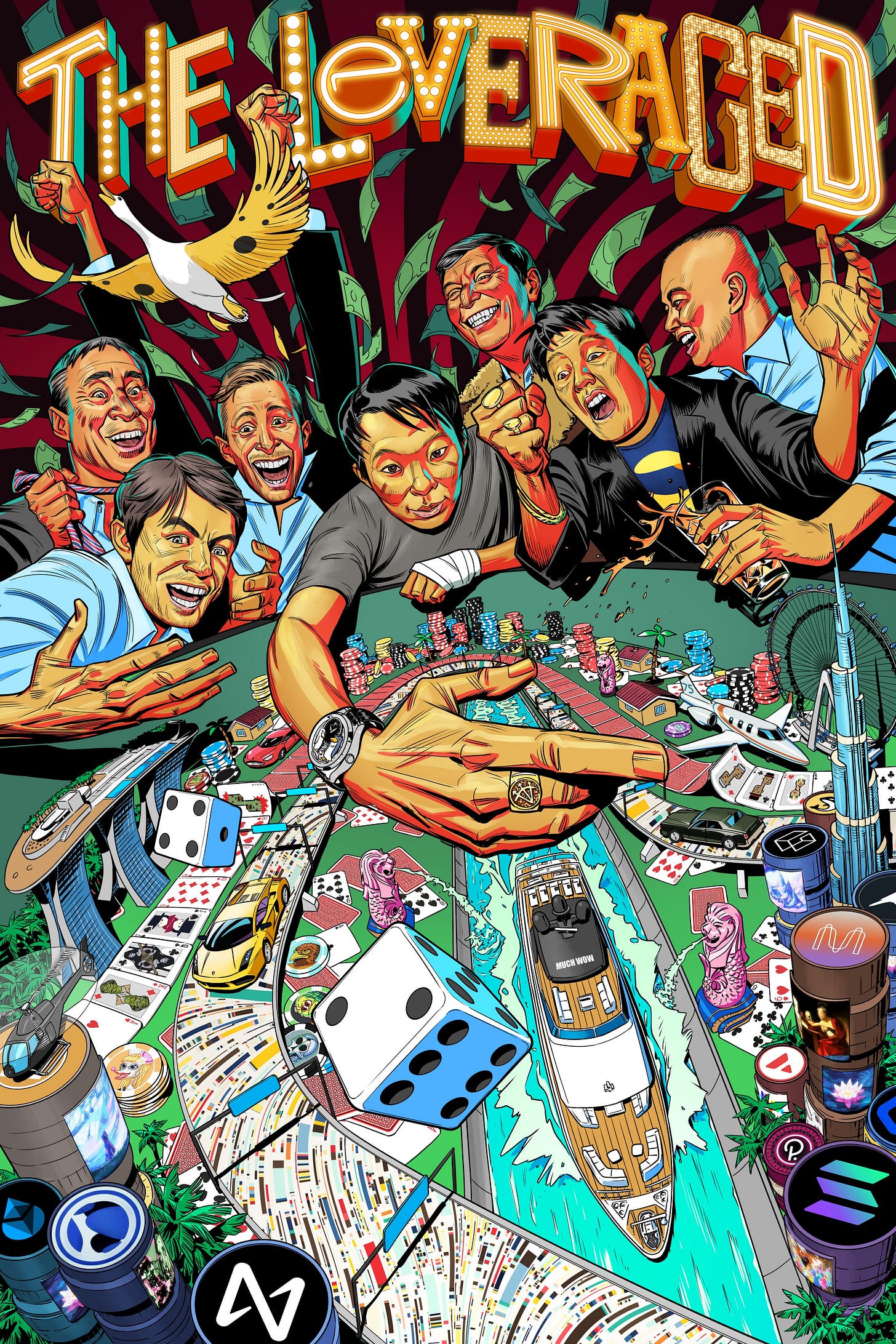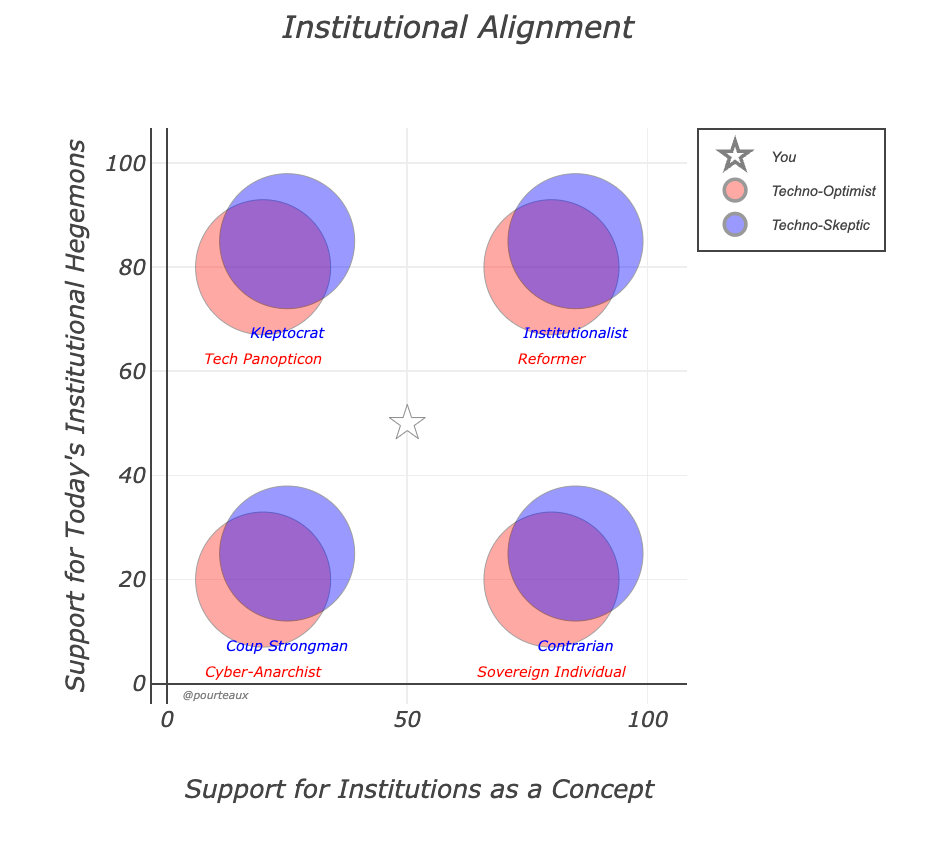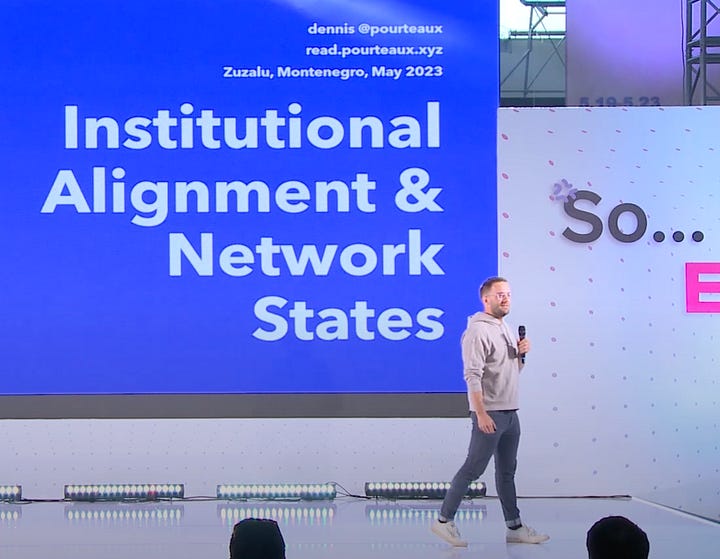What if we could embrace the animal spirits of degenerate crypto speculation while aligning that behavior with the common good? What if we could re-arrange society on this principle? This was the proposal for “Degen Communism” from Vitalik Buterin in this year’s April 1st blog post. As with the prior 4/1 post advocating for Bitcoin maximalism, I’d contend that the arguments he puts forth are not April Fools jokes as much as they are a way to “try on” or steelman a serious idea and as a nidus for discussion.
Society and technology are particular interests of mine, and given that I was cited in Vitalik’s post (essentially as representative of a coping neoliberal advocate for the genteel old order), I wanted to write a short note considering these ideas.
Vitalik describes the problem in his own words:
“In 2024, there is a widespread feeling throughout the Western world that all of our political ideologies are outdated, and are increasingly failing us. Old ideas that have dominated elite political thought, whether capitalism or liberalism or progressive social democracy or whatever else, are rapidly losing popularity.
…
Some are trying to respond to this crisis by reminding us of the virtues of the old ideals of civility and decorum, hoping that we could wind back the clock and return to them. My friend Dennis Pourteaux is a good example of this kind of mentality”
First, Vitalik argues that the old order is dead and you can’t go back. He quotes my post where I advocate for “policy rivals who agree on civics” alongside a picture of past presidents from both US parties. This is indeed my ideal society: one where spirited debate leads to a battle for ideas, and then a democratic process with checks and balances enacts the expressed will of the citizens. Just writing about it makes me feel warm and fuzzy inside. But Vitalik labels this as reactionary: the internet has disrupted this old order and there’s no going back.
Instead, the citizens of the internet want chaos and degeneracy. They want to be able to bet it all on red and spin the wheel. Or more charitably, perhaps they want to take their life into their own hands and try experimental life extension à la Bryan Johnson. Or, they want to remake the financial system on an algorithmic dollar like Do Kwon’s defunct UST. There will be some monumental breakthroughs, and many more spectacular failures, but the point is that the degeneracy is permissible (even celebrated). Those who win can usurp the old elites who force stagnation on the rest of us for the sake of “stability” that really just serves to entrench their own interests. And in doing so, disruptors will move society forward.

The other half of the equation is the “communism”: failures will be widespread, and the most vulnerable should be insulated from catastrophe. Degeneracy itself could even be aligned for betterment of the common good. Vitalik offers a number of examples of how this might work in both crypto and in government policy. In crypto, Vitalik advocates that the smallest “retail” speculators be reimbursed after a collapse, memecoins be paired with a charitable benefactor, that airdrops be equitable, and projects that can fork to remove bad actors. In public policy, Vitalik advocates for a land value tax that would disrupt entrenched NIMBYs and a Harberger Tax on Intellectual Property which would permit dynamic innovation by removing exclusivity unless IP owners pay a “tax” proportional to its value. He advocates for permissive immigration that focuses on keeping out the highest risk individuals and “proof of stake” schemes to incentivize good behavior.
So what is my assessment of Degen Communism?
My view is that Vitalik is (or should be) actually championing neoliberalism, albeit a reform-minded and techno-optimist variety.
Allowing individuals to take risks while also having a safety net for the most vulnerable isn’t some new emergent ideology borne out of cryptocurrency, but the foundation of basically all developed countries. The United States has done a terrific job of usurping its own elites time and time again, rewarding the champions of new technologies with untold wealth and influence, only to be overshadowed by the titans of the next tech wave. Telcom executives were eventually overshadowed by personal computing executives, and then internet executives, and then tech and eventually AI founders. And this disruptive innovation and risk taking is for the benefit of all society. The rich pay for the safety net of those at the margins and they create technology and companies that bring tremendous value to our daily lives.
This isn’t to say that the current neoliberal order is fine as is: the problems Vitalik points out with NIMBYs, chaotic and restrictive immigration, etc are real and long overdue for reform or replacement. And these are the tip of the iceberg: I’ve spent countless hours pouring over what I’d estimate are even bigger threats, like populist nationalism or ascendant revisionist countries set to reshape the world order. And indeed, the world seems ever more chaotic and establishment powers are having a crisis in credibility.

Thus what I advocate for is a techno-optimist reform of our current neoliberal institutions, many of which I assess to still have value. We should use crypto, AI, and all emerging technologies to reform or in some instances replace what our institutions do today (see my video discussion at Zuzalu). This could mean that the Federal Reserve begins buying bitcoin, that DeFi is integrated into tradfi markets, that AI helps workers submit their tax returns, that cryptography and zero knowledge proofs restore trust in civic processes, and that even new network states are seeded that compete with traditional states (and thereby incentivize both to improve). Vitalik is also a proponent of Community Notes style cross-tribal bridging, which could be helpful in decision making or truth discovery.
All of these developments are promising, and some are finally within reach.




As a medical doctor, I work with a lot of individuals at the margins of society who are dependent on the continued functioning of legacy institutions. They depend on Medicaid for their healthcare, Social Security to buy groceries, the NYC subway to move around town, and establishment media for news. Many are migrants from authoritarian countries and cherish the United States’ flawed democracy more than those of us who see it as our birthright. They don’t have the luxury of being able to “exit” to a tax haven or build a network state. This isn’t to say I’m not enthusiastic about these new technologies or ways to structure society (in fact, I’m endlessly enthusiastic about them), I just know that the exit we are accelerating towards hasn’t arrived yet. Let’s keep building it (and make sure it’s good)!



